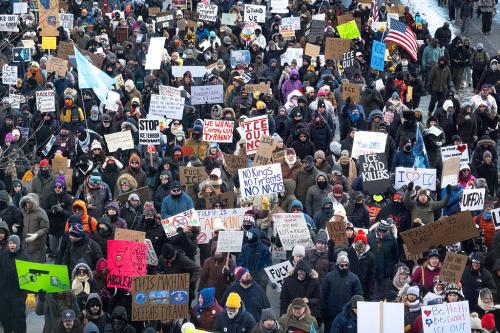Panamanians put an end to the continuity efforts of the ruling party and, last May 4, reasserted their traditional faith in democracy and in alternation, when 2.5 million cast their votes to elect the President, a Vice-President, 71 deputies, and the officials for many local and regional positions. Even though they were the most contested elections in recent history, Election Day was characterized by absolute normality and by a high turnout (76.7%), a fact that was acknowledged by all of the electoral observation missions. Before the elections, the environment was heavy, characterized by negative campaigns and spurred on by surveys which forecast very tight results, something which at the end was not the case.
Surprising Outcome
Incumbent Vice President and former running mate of President Martinelli, Juan Carlos Varela, of the Panamanian Party (center-right), placed third in the surveys, but he surprised everybody by prevailing over the other two candidates with 39.1% of the votes. Former minister Jose Domingo Arias, of the ruling Democratic Change Party (CD in Spanish), got 31.4% of the vote, and the former Mayor of Panama City, Juan Carlos Navarro, of the Democratic Revolutionary Party (PRD in Spanish) got 28.1%. Thus, alternation in power was preserved in Panama, where it has been present since 1989.
However, Varela’s win in the Executive was not matched at the Legislative Assembly. The United For Change Alliance –formed by the Nationalist Republican Liberal Movement Party (MOLIRENA) and the Democratic Change Party—got the most seats (32), followed by the PRD (25), and in the third place Varela’s coalition (Panamanian and Popular Party) with only 13 deputies. There is also an independent legislator. It is a must to bear in mind that these figures might change, since there currently are over 10 seats impugned before the Electoral Tribunal, most of them against CD, because of inappropriate use of state resources during the electoral campaign. This distribution of the legislative forces makes a must for Varela to seek agreements with the PRD (negotiations which are already under way), to prevent Martinelli from keeping control of the Legislative and, therefore, make governance complex.
In Spite of His High Popularity, Martinelli Lost
The serious privation which large sectors of the population suffer in areas such as drinking water, shortage of housing, lack of security and, above all, the high cost of the basic food basket played a major role in the defeat of the ruling party. Also, because consecutive reelection is banned, Martinelli imposed his wife Marta Linares as candidate to the vice-presidency, in an attempt to continue exerting major influence in the new government. These, compounded with recurrent and serious denunciations of corruption, were factors that prompted votes against a new term by Democratic Change (CD).
Even though under the current administration Panama was one of the countries with the largest economic growth in the world –with an average 6.8% a year from 2000 to 2012 and 8% a year during Martinelli’s term—this was not enough to grant continuation. In the last five years, poverty decreased very slowly: from 33% in 2009 to 27% in 2013. And, even though Panama has the largest per capita GDP in the Central American region, the country ails of serious lacks in human development; at the same time, it records high inequality (a Gini coefficient of 0.53).
Varela’s Challenges
Varela inherits an economy of over 36 billion U.S. dollars, which has been growing in recent years at double the Latin American regional average, driven by strong government spending. For this year, the Economic Commission for Latin America and the Caribbean (ECLAC) forecasts a light deceleration at 7% (high above its 2.7% estimate for Latin America). And even though the unemployment rate dropped to 4%, inflation in turn went up, bringing about a 27% increase in the basic food basket during Martinelli’s term and becoming the major complaint of Panamanians, next to the one for lack of security.
Aware of this serious problem, the president elect has just asserted that on his first day in office (July 1) he will sign a decree to freeze the price of 22 products in the basic food basket. This promise has encouraged a strong reaction from some critics, who believe that measures of this kind (similar to those which are being enforced in Venezuela and Argentina) not only do not solve the problem but rather end up by worsening it.
In his first statements, Varela pointed out that his major legacy will be “a functional democracy at the service of the people.” In order to do so, he must meet an ambitious government agenda: keeping the high growth rates and the execution ability which is Martinelli’s major legacy, expanding and improving the efficiency of social programs for the poorest, as well as improving the coverage and quality of education, including the bilingual one. Also, and certainly, a central part of his administration will focus on the head-on fight against lack of security and against corruption. Varela clearly said so in his first speech: “Politics in Panama is going to change from business to service. The business is over.” It must be remembered that, according to the Perception of Corruption Index developed by International Transparency (2013), Panama places 102nd in a 177-country ranking.
Varela must also strengthen Panamanian democratic institutions. There is consensus on the serious deterioration which most of the public powers have suffered during Martinelli’s administration. In this sense, the president elect has stated interest in reforming the 1972 Constitution and in modernizing the political electoral juridical framework.
Regarding this last point, the reform must pay special attention to the reports of electoral monitors in the recent election. The Electoral Observation Mission of the Organization of American States praised the organization of the election, but was critical of the “meddling” of the Executive Branch in the process. Also, the observers confirmed the “precarious regulations for campaign funding”, because current regulations do not set limits or controls for private donations to cover spending in electoral materials in this country. For its part, the Carter Center pointed out that “the time is ripe (…) to reflect on the measures and reforms needed to ensure that future elections are conducted on more equitable terms; greater transparency in campaign revenues and expenditures, as well as access to the media; more transparency and control over the abuse of state resources; and strict compliance with the ban on public authorities to actively campaign, among other key issues.”
Concluding Thoughts
Speaking in political terms, this election became a sort of referendum on the continuity proposal by Martinelli. Varela, thanks to an intelligent campaign based on three issues –“water, food, and security”—and a clear message –“more money in your pocket”—, was able to position himself as Martinelli’s leading opponent and, benefitting from the protest vote, won the race in favor of alternation.
The task ahead of him is huge. His major challenge in the medium term is fulfilling his campaign promises and to be up to expectations about his performance. According to the World Economic Forum, Panama is one of the most competitive economies in the region (it places second after Chile); however, its institutions are weak and lack transparency, and, as we have already pointed out, it has serious lacks in human development.
Also, a less favorable international environment and the delays in the enlargement of the Canal (a U.S.$2.6-billion drop is estimated on revenues from the Canal in the 2015-2018 period) will demand from Varela, if he wants to keep the high growth rates of recent years –as international risk rating firm Fitch Ratings has recommended—exerting strict fiscal discipline to prevent an increase in the debt, which shot upward during Martinelli’s term. On the other hand, considering the limited parliamentary power he has, he must reach agreements with the PRD legislators that would warrant him enough governance to carry out a government plan which has a strong emphasis on the social area, full respect for democratic institutions, and a head-on attack on corruption.
This article was initially published by IDEA International.
The Brookings Institution is committed to quality, independence, and impact.
We are supported by a diverse array of funders. In line with our values and policies, each Brookings publication represents the sole views of its author(s).



Commentary
Op-edPanama Stands Up For Alternation
May 17, 2014